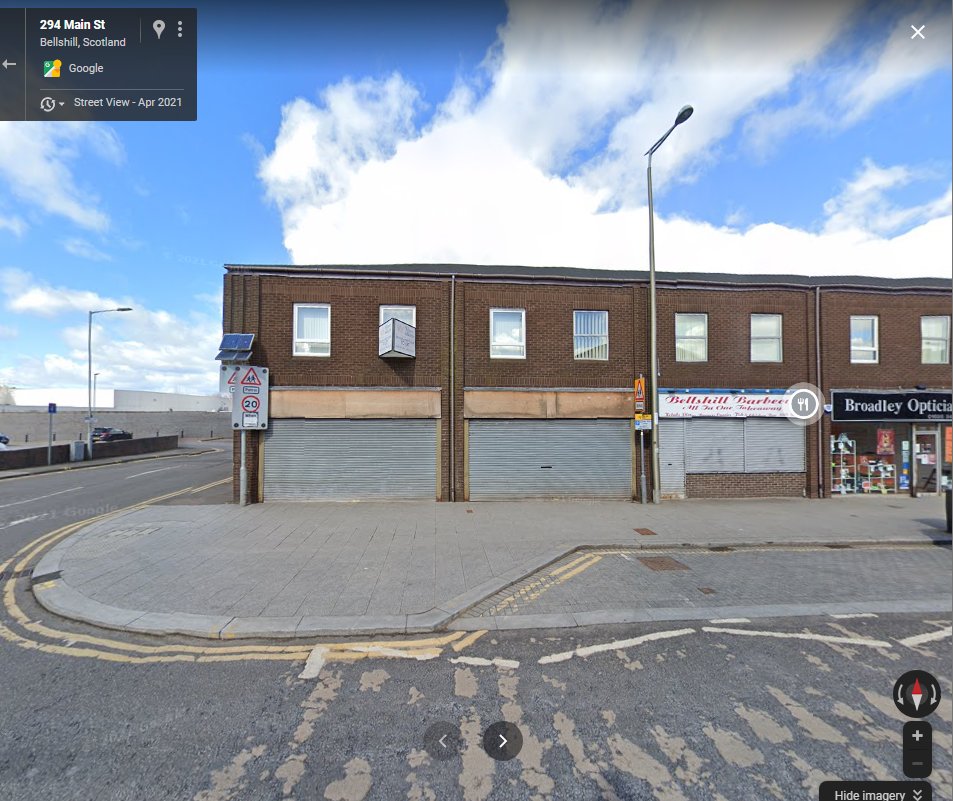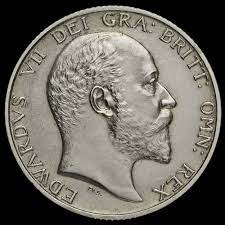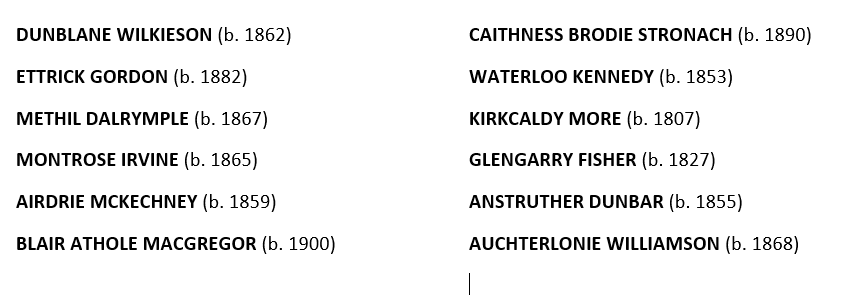Before Beach Boys vs. Chuck Berry, Vanilla Ice vs. Queen/Bowie, Ed Sheeran vs. Marvin Gaye, or Ed Sheeran vs. all those other musicians, there was:
Vera Lynn vs. Roberton (yes that Vera Lynn)
Read on for bans from the BBC & bagpipes in the High Court (🧵)
#OldWeirdScotland
Vera Lynn vs. Roberton (yes that Vera Lynn)
Read on for bans from the BBC & bagpipes in the High Court (🧵)
#OldWeirdScotland

For the few unfamiliar with Vera Lynn, she was the sweetheart of the British Armed Forces during WW2. She sang songs of love and longing for old England and she now has mythological status for "getting Britain through The War". Had a 96yr musical career. National treasure tier. 

Sir Hugh S. Roberton (1874-1952) is not a name most people recognise, but if you are into folk music, or went to school in Scotland in the last 50 years, you'll know his work.
"Step we gaily, on we go..."
"Step we gaily, on we go..."

Roberton was a choir conductor and composer, but he also penned English lyrics to Gaelic folksongs. Classics of the Scottish folk canon, like "Mairi's Wedding", "Mingulay Boat Song", "Uist Tramping Song", and "Westering Home" are all his. 

And it was "Westering Home" that caused a stooshie with Vera Lynn in the summer of 1957--a stooshie that wouldn't get resolved until it was heard in the High Court in London (and heard every which way indeed!).
In June 1957, Vera Lynn released the single "Travellin' Home" (you see already where this is going...), to a somewhat mixed response from music critics, but sold well enough to chart at #20. 

Travellin' Home (henceforth, Travellin) is a wistful love song about being away from home and returning to harbour.
Westering Home (henceforth Westering), is a song about being away from home and being excited to return to harbour (on Islay).
Westering Home (henceforth Westering), is a song about being away from home and being excited to return to harbour (on Islay).
Let's hear them both side by side.
On the left is Westering sung by Father Sydney MacEwan in 1956, and on the right, Travellin sung by Vera Lynn a year later in 1957.
(I've kept both clips under 30 secs for copyright purposes...) twitter.com/i/web/status/1…
On the left is Westering sung by Father Sydney MacEwan in 1956, and on the right, Travellin sung by Vera Lynn a year later in 1957.
(I've kept both clips under 30 secs for copyright purposes...) twitter.com/i/web/status/1…
Of the new record, Lynn's husband and manager, Harry Lewis, told journalists:
"we heard the old Scottish song, Westering Home [and thought] wouldn't this sound great played with a beat?"
He phoned songwriter, Alex Masters: "We want new lyrics quickly!"
"we heard the old Scottish song, Westering Home [and thought] wouldn't this sound great played with a beat?"
He phoned songwriter, Alex Masters: "We want new lyrics quickly!"

But was Westering really an "old Scottish song"?
Roberton's family said no, it wasn't.
Roberton published and copyrighted his words and musical arrangement in 1939.
Westering Home was printed by his own music publishers, Curwen and Sons.
Roberton's family said no, it wasn't.
Roberton published and copyrighted his words and musical arrangement in 1939.
Westering Home was printed by his own music publishers, Curwen and Sons.

Roberton's wife and sons sued Lynn and Lewis, and Masters and R. B. Rowe, the songwriters. They also sought an injunction against Decca selling any more copies of Travellin.
Lewis et al. denied any infringement. A court order said sales should stop until the matter resolved.
Lewis et al. denied any infringement. A court order said sales should stop until the matter resolved.

Decca withdrew the record. The BBC banned their disc jockeys from playing Travellin. Lynn, who had her own BBC TV series, "Vera Lynn Sings!" was also forbidden by the BBC from singing it on the air. 

SIDEBAR: This wasn't Lynn's (or Roberton's) first BBC ban. In 1942, Lynn's radio programme "Sincerely Yours", for troops overseas, was taken off air for 18months; the BBC feared her sentimental songs would undermine the "virility" of Britain's fighting men... 

... Roberton by contrast was an outspoken pacifist and Peace Pledge Union member. His views earned him and the Glasgow Orpheus Choir a permanent ban from the BBC in 1941. 
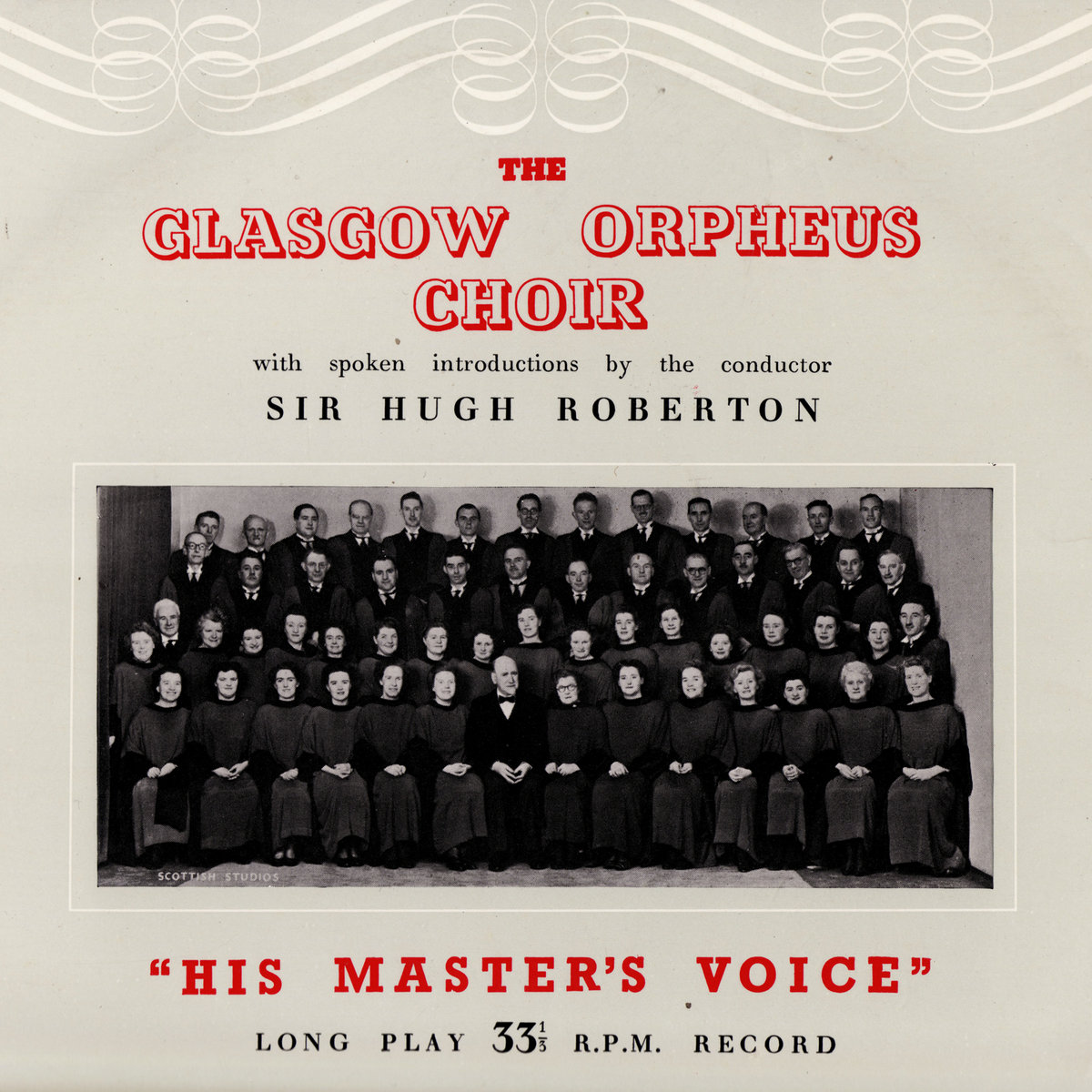
Anyway, it wouldn't be until May 1960 that the case was heard at the High Court in London (and the fun begins).
Hearing the case is Justice Cross.
Justice Cross can't read music and (it is rumoured) is tone deaf.
Hearing the case is Justice Cross.
Justice Cross can't read music and (it is rumoured) is tone deaf.

To recap: The Robertons argued that Travellin ripped off the voice line (melody) of Westering, which Sir Hugh wrote, and which was published 1939 by him. Scottish tenor, Robert Wilson was the first to record it in 1945.
A gramophone was brought in and Wilson's disc played.
A gramophone was brought in and Wilson's disc played.

The songwriters and Decca's man, Dick Rowe, denied to having heard Wilson's disc before writing and recording Travellin.
They'd heard the melody from a piper who said it was an "old Scottish air". Any similarities were coincidental...
They'd heard the melody from a piper who said it was an "old Scottish air". Any similarities were coincidental...
SIDEBAR: Dick Rowe, the Decca exec in the stand here, was famously the guy who passed on the Beatles ("guitar groups are on their way out Mr Epstein"), but later signed the Stones. Swings and roundabouts I suppose. 

A piano was then squeezed into the court and a musically-minded QC played Travellin, Westering, and the tunes Bonnie Strathyre, Muckin o' Geordie's Byre, and Eilean Mo Chridh, which all share a common refrain. Never before had the High Court had a concert performed in it. 

Following along with Roberton's sheet music was the BBC's head of Scottish Music, Dr Sieman. Only Travellin and Westering had a composed verse section and he opined that it was basically impossible for Travellin's version to have evolved independently of Roberton's song.
Justice Cross then asked President of the Gaelic Society of London and former head of the Mod, James MacPhee to sing "Eilean Mo Chridh" (which was unarguably ancient) for the court. MacPhee had never heard any Gaelic air or song that matched Roberton's verse section. 

Professor of Music and former head of the British Arts Council, Sir James S. Wilson said right out that he thought Travellin was a direct copy of Westering--to say otherwise was ludicrous. The Robertons seemed to have Lynn et al. bang to rights on day one.
Next day the defence appeared with six pipers of various ages who all claimed to have known the verse and refrain as "an old Scots air". One claimed to have heard it as early as 1910 "when he was a wee laddie". No less than the Queen's personal piper made a similar claim. 

Pipe Major Robert Crabb, the Queen's piper recalled he had heard the song sometime around 1949 or 1950 sung by a sergeant while in Malaya and thought that would make a good pipe tune. He then played it a lot, perhaps thats where the songwriters knew it from? 

Another piper was asked to play the nameless "old Scots air", both verse and refrain "from memory" which he duly did after kittling up his pipes. Deafened, Justice Cross thanked the piper and dismissed him.
The defence won points with the pipers, royal and plenty, and fed the idea that Westering was just an old pipe air given words. Gerald Pointon, solicitor for the defence then brought out a killer bit of evidence tailored to the judge that couldn't read music.
Entered into evidence was a score sheet with "Westering Home (Eilean Mo Chridh)" as in the Scots Guards piping book, "Westering Home" as arranged by Hugh S. Roberton, and Travellin' Home. All transposed to the same key, but with Travellin in 3/4 time.
📷: @UCamCIPIL
📷: @UCamCIPIL

Written out like this, it implied a chronological order and the 6/8 time signature made Roberton's arrangement look identical to the Scots Guards' version at a glance by someone who couldn't read music. Travellin looks very different in 3/4 time.
Justice Cross decided after the third day of hearings that Vera Lynn et al. had not infringed on Roberton's claim and ordered the Robertons and Curwen the publishers to pay £5000 in costs for the defence. Lynn left the courtroom humming Travellin/Westering. 
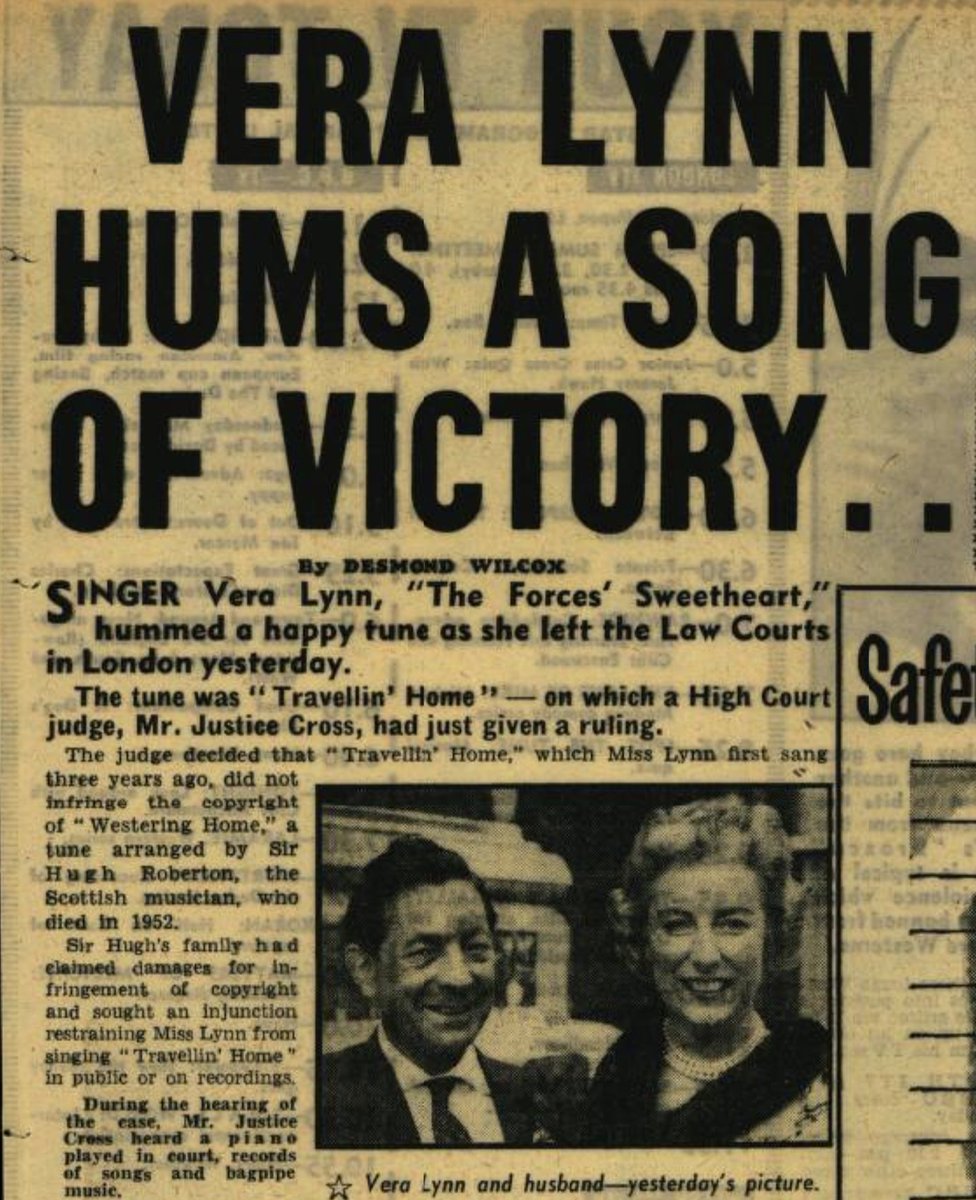
Curwen the music publishers were ruined. It wasn't until the 1970s that Roberton's works (many choral) were again available in print. One of his sons formed another company to publish his father's work.
Vera Lynn re-released the single. Decca ordered 50,000 copies to be made
Vera Lynn re-released the single. Decca ordered 50,000 copies to be made

Lynn told reporters that she'd lost £15,000 in royalties over the three years Travellin was off shelves. The original release had sold 27,000 copies before it was withdrawn. She expected the 1960 reissue to reach the top ten.
It did not. It actually did worse than it did before. The UK music scene between 1957 and 1960 saw massive change, Lynn's brand of nostalgia wasn't selling anymore. Travellin' Home (1957) was Vera Lynn's last charting single until 2009.
Lynn, Lewis, and Decca definitely tried to capitalise on the lawsuit excitement. She pretended to have forgotten the words before singing it on her BBC show.
They also paired it with a new B-side...
"The Gathering of the Clans"
Feelin brave? Listen:
They also paired it with a new B-side...
"The Gathering of the Clans"
Feelin brave? Listen:
Travellin Home, no matter its side-dish, had lost its flavour.
There's more to be said and some interesting post-match analysis to be had, but I'll take a break now.
#OldWeirdScotland
There's more to be said and some interesting post-match analysis to be had, but I'll take a break now.
#OldWeirdScotland

PART DEUX
https://twitter.com/WeirdScotland/status/1648797173801205762?t=9rnsDFXBVRlDreXntEv9wg&s=19
• • •
Missing some Tweet in this thread? You can try to
force a refresh









